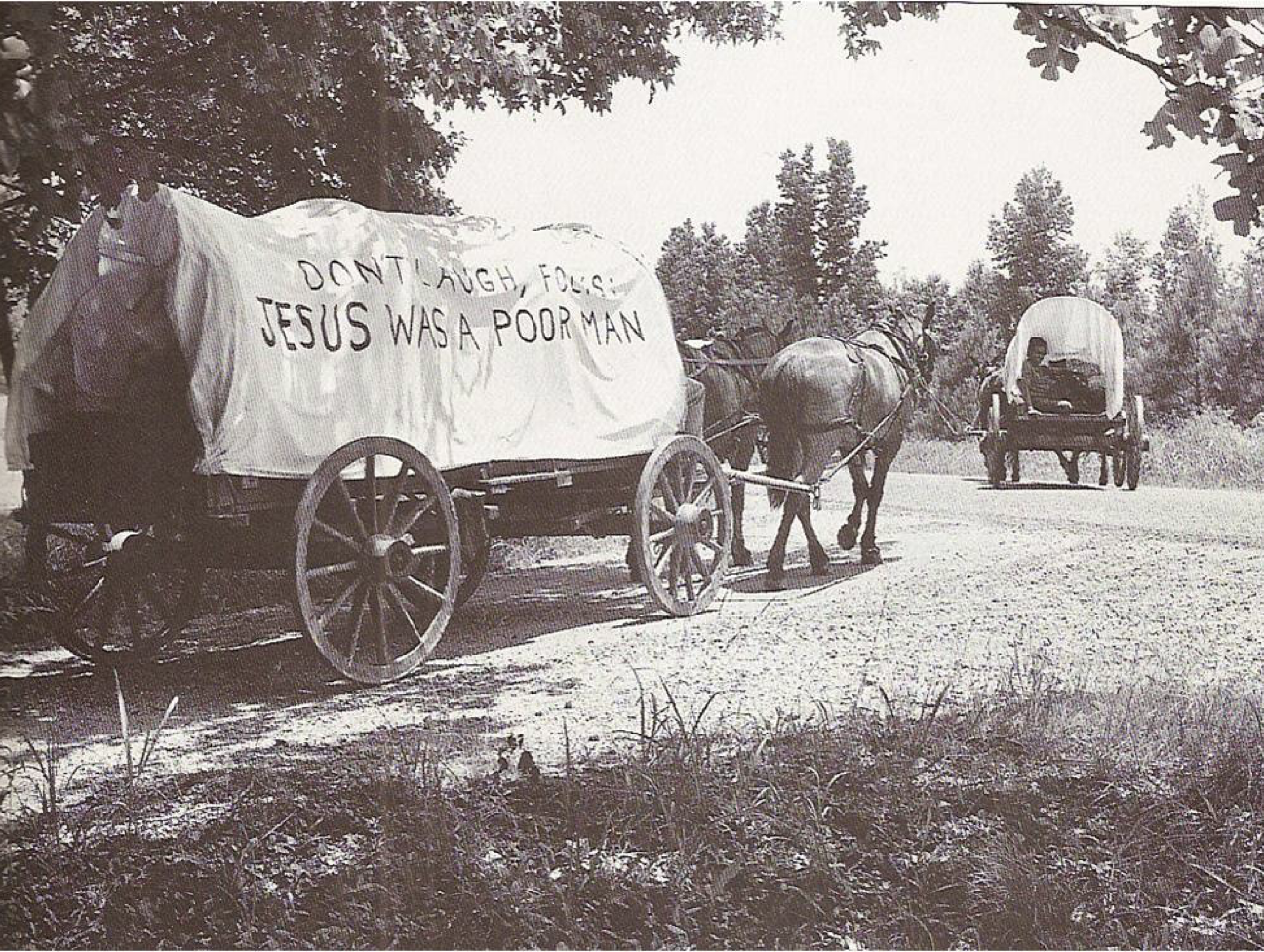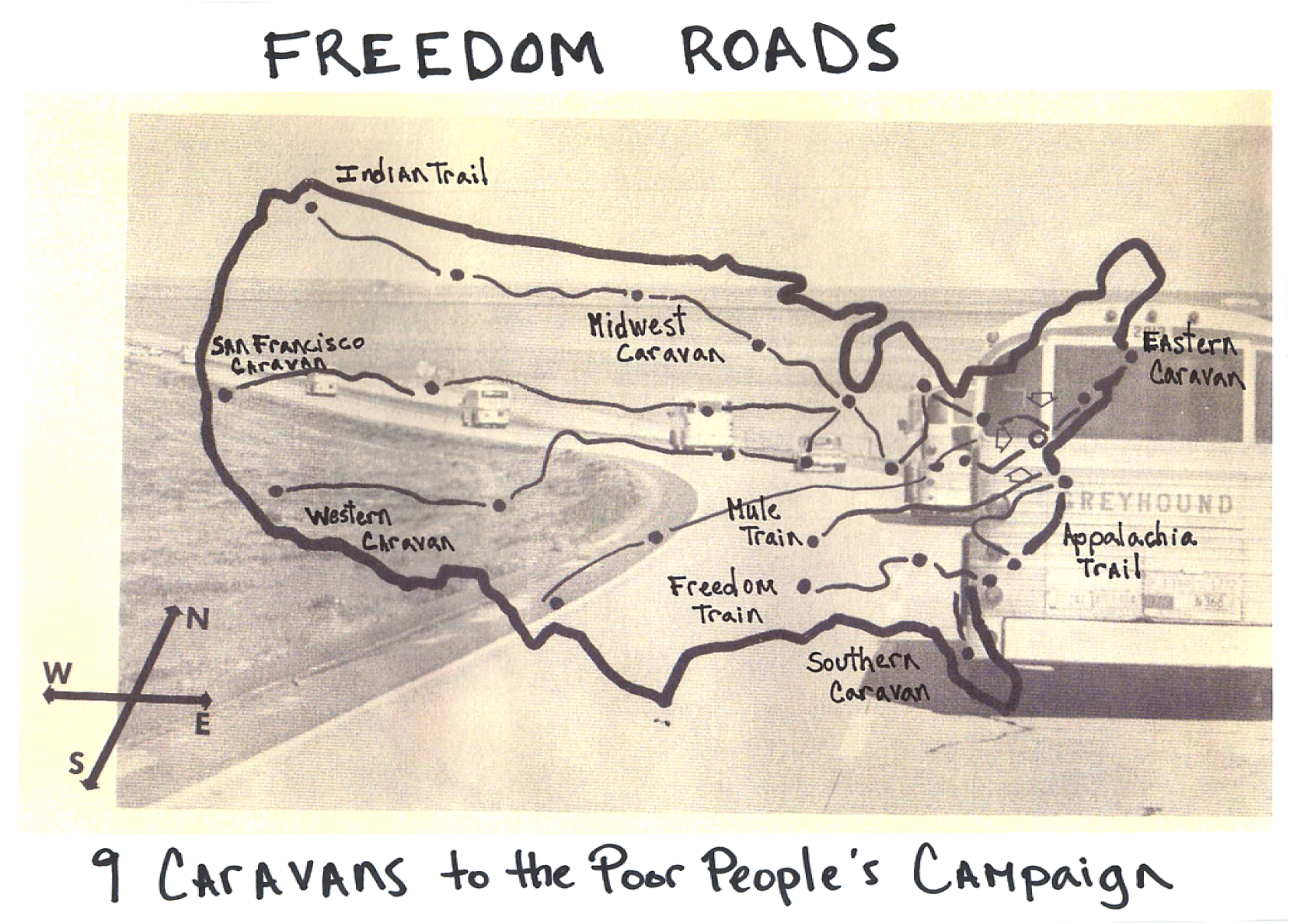Transgressing the Boundaries of Empire
Three Palm-Sunday Processionals That Show the Way
Hello Friends,
I hope that you found rest and restoration with the past weekend and are finding hope amidst so many tragedies, from the natural ones to the human-made ones. Particularly on my mind are the transgender bans running rampant across the country, causing unnecessary fear in many families and young people, and the recent school shootings in Denver and Nashville (at least that I know of). I know readers of this newsletter also care about these issues and finding ways forward so that we can protect not just our loved ones but the loved ones of others as well. We have much work to be done.
What I have to share today, I hope, can offer a bit of perspective in remembering that there are people and movements throughout history that have pushed up against the wickedness of their times. Ever since there was empire there has been misuses and abuses of power.
Below, I share the full text of a sermon I shared at a local meeting this past Sunday, April 2, 2023, for Palm Sunday. Perhaps, we will find hope in those who have – despite their fears – set foot in unknown terrain to bring about a new world.
Thank you for reading,
Wess Daniels
Haw River Watershed (Greensboro, NC)
A Palm Sunday Aside:
Christians celebrated Palm Sunday this past weekend and those us of in that tradition now find ourselves in “Holy Week.” If there ever was a time within the Christian liturgies to be reflecting on our relationship to empire, power, and its impact on the most vulnerable among us, then I believe it is now. Jesus’ death showed what confrontation with (the Roman) empire looked like, while keeping his heart and mind set on “things above,” as Paul wrote. We too can find the courage to confront these earthly powers that wish to do us all harm with the shame “imagination.” A key revelation from the Easter story is that it is not God who demands the sacrifice of the son, it is the insatiable mob, humans under the spell of empire, perhaps even you and me, who are the ones hungry for revenge (a spilt blood). Jesus’ death reveals the underlying conflict between parties using a scapegoat for cover. But in fact, we humans are the ones guilty of enmity against one another. We are the ones willing to go to great lengths to cover up, avoid, and keep those hurts alive even when it costs us great devastation both personally and communally. Our problems today – from political to social to natural – are not because God is angry with us but because we humans refuse to enter into the forgiveness and reconciliation necessary to bring about a new world (I am sure fear is part of this equation as well). This is what the Easter brings up for me each year.
Transgressing the Boundaries of Empire

A reading from John 12:12–16:
“The next day the great crowd that had come to the festival heard that Jesus was coming to Jerusalem. So they took branches of palm trees and went out to meet him, shouting, “Hosanna! Blessed is the one who comes in the name of the Lord— the King of Israel!” Jesus found a young donkey and sat on it; as it is written: “Do not be afraid, daughter of Zion. Look, your king is coming, sitting on a donkey’s colt!” His disciples did not understand these things at first; but when Jesus was glorified, then they remembered that these things had been written of him and had been done to him.”
Crossing Thresholds
As many of you know, today is the day we recognize Palm Sunday in the Christian Tradition. This morning, I want us to look at Palm Sunday as an example of what it means for people of faith, starting with Jesus, to cross over certain thresholds or boundaries in our world.
We all know what a threshold is.
It is a boundary marker that delineates one space from another. When you walked through the doors to the meeting house this morning, you crossed a threshold. Thresholds are barriers, sometimes visible and sometimes invisible. Sometimes the threshold is the entry into good and safe space, like a meeting house, but sometimes a threshold gives way to harm.
Jerome Berryman says that:
“A threshold sets apart but it also provides the way into a different space.”
Jim Crow was a threshold, sometimes invisible, usually visible, that could not be crossed without the threat of severe punishment or death.
The first time I visited the Civil Rights Museum in downtown, one thing that struck me, that I hadn’t ever seen in person before, was the separate entrances that African Americans and other people of color had to use to enter the train station versus those who were white.
That is a very specific threshold that marked a legal boundary; redlining is another that comes to mind. Another is the visible and invisible admission qualifications to colleges. Or where people could or could not sit, if they could visit Quaker meetings at all.
These are all thresholds used to sustain segregation and racism, and slowly, over time, those thresholds have been crossed over in efforts to dismantle them. The sit-ins, the bus boycotts, and the marches were all group efforts to cross thresholds often too dangerous to do alone.
I want to note that not all thresholds have negative connotations, of course, but in honor of Jesus’ donkey ride on Palm Sunday, we’re focusing on the thresholds and boundaries of empire that need to be dismantled.
Here is a query to consider:
If Empire uses thresholds to create boundaries that keep people in their place, then what about those who have in history sought to transgress those boundaries?
Let us look at three processionals of those who have sought to push against various thresholds of empire.
The Mule-Train Processional
Rev. Dr. Martin Luther King Jr. was assassinated only three days before Palm Sunday on April 4th, 1968. Only a few weeks after the assassination, his life’s crowning work, the Poor People’s Campaign, was launched.
Over the last couple of years of his life, King became increasingly razor-focused on building a coalition of the poor, hoping to bring awareness to the plight of the poor and ending poverty.
In his Riverside Sermon he delivered the year before called, “Beyond Vietnam: A Time to Break the Silence,” he denounced the Vietnam war in large part because of its crippling impact on the poor within our society, acting – as he said – like a “demonic, destructive suction tube” that sucked up all the resources that could be used to care for the poor in our society.
Thus, when, on April 29, the Poor People’s campaign launched, without their crucial leader, all those broken-hearted people had even more cause to press into the capital of our country and call for deep systemic change.
Poor people and those who supported them rode in nine different caravans from all over the country, their faces and hearts set toward DC with a determination that would not be overcome. Older adults, parents, single people, teenagers, and children took: the “Eastern Caravan,” the “Appalachia Trail,” The “Southern Caravan,” The “Midwest Caravan,” the “Indian Trail,” the “San Francisco Caravan,” the “Western Caravan,” the “Mule Train,” and the “Freedom Train” (A New and Unsettling Force, 25).

In a reenactment of Palm Sunday, people took a “Mule Train” up from Marks, MS to D.C. Bertha Burres, known as the mother of the PPC’s Mule Train said, that the Mules symbolized the parts of our history as people migrated West in hopes of “new beginnings.”
Burres also said, “[King] thought they went out there…[to] start a new beginning, and he said that that would be good for us because we needed a new beginning. We had need of everything. We need housing, food stamps…we need help…[including] medical attention” (ibid., 38).
Imagine with me this morning the Poor People’s Palm Sunday Processional, transgressing that threshold of empire that continues to separate, victimize and silence the poor in our country. Riding into the center of the American Empire on mules, they called out for a new beginning for the poor and in doing so they physically crossed over the thresholds of classism, racism, ableism, and other boundaries that keep people’s backs against the wall.
And when they got to the Mall in DC, they built a tent community – do you remember what they called it — “Resurrection City.” They were announcing their belief in the possibility of a new and beloved community led by and for the poor could end poverty.
A second “Quakerly” processional.
James Nayler was central to Early Quaker leadership. Some scholars believe that he and Fox actually competed for the top role in the movement. Leading up to that fateful day on October 24th, 1656, James Nayler and George Fox had a falling out may very well be an event that changed the course of Quaker history.
Nayler wanted to distance and differentiate himself from Fox’s leadership, feeling that Fox was too much of a gradualist when it came to dealing with the political and religious authorities of the time. This all came to a head in Bristol where Fox and Quaker leadership were trying to find a compromise in an already very tense relationship with the city government. Bristol was a “powdered keg” set to erupt in Fox’s face at any moment (as one Quaker scholar put it).
A little background is in order: before becoming a Quaker, Nayler, who earlier in life was in the Parliamentarian Army, because a Seeker who believed that faith had become swayed by empire and believed, as Ben Pink Dandelion notes,
“God would not take humanity backward, especially to a faith which had been so easily corrupted before, but that they were living in a new and distinct age” (2007: 14).
Nayler believed now was not the time for compromise because “this is the day,” and this is the time of the new age of God. And in keeping with this conviction, Nayler wanted to declare the new age had arrived.
I believe this is why on October 24, 1656, Nayler took a Palm Sunday mule train ride of his own. He mounted a donkey and rode through the center of Bristol while those around him said “Holy, Holy, Holy, Hosanna…” Nayler’s Palm Sunday processional reminds us of how powerfully provocative the Hebrew and Christian text speak to the practice of public theater. Reenactment is a powerful practice within our religious tradition. And as we have seen many times over, a powerful reenactment of a symbolic action calling for change will get you in trouble.
I believe that Nayler’s Palm Sunday processional was about acting out & challenging the structures of society that go to great lengths to maintain the status quo – even sometimes upheld by our very own Quaker leadership. And that this is at least partly why we are tempted to dismiss the action simply as errant.
In his reenactment of Palm Sunday, Nayler crossed over the threshold of our inertia, comfort, and passiveness that are true not just for politicians and bureaucrats but those within our faith movements as well. He showed the symbolic power of the biblical story to span centuries and speak volumes with very few words needed. The choice to reenact the biblical story of Palm Sunday biblical shows that he understood Palm Sunday to be a counter-text to the corruption that power and empire always bring.
Our third processional is the first processional.
Our final image is the one that started this thread. It comes from the Gospel of John which says that Jesus rode a young donkey into Jerusalem, while a “great crowd” waved palms branches, saying:
> “Hosanna! Blessed is the one who comes in the name of the Lord— the King of Israel!”
NT Scholar Wes Howard-Brook says that the crowd is participating in a “Liturgical Direct Action,” because they are using powerful symbols together with powerful words.
The palms were symbolic of revolution, pointing to the fact that the crowd believed Jesus to be the new Maccabaeus, the new liberator, who will become a national leader and overthrow the emperor — who would, if necessary, violently restore the temple (WHB; cf. 2 Mac 10:7).
We know that at least one of the 12, Judas, was himself a Zealot and believed in the violent overthrow of empire as well.
Over against this image of power and violence, something shocking happens: Jesus takes a mule train ride into the center of empire. He subverted the symbols to announce a new beginning, a new kingdom.
My friend and Australian Peace Activist, Jarrod McKenna, says instead of Jesus riding a tank into the center of Jerusalem to confront Roman authorities, as people would have expected, Jesus came riding a tricycle.

The New Testament texts are clear on this: This is a new kind of liberator, who brings about a new kind of kingdom through solidarity, generosity, and sharing access to God.
Jesus’ was a movement where the poor were at the forefront of the movement led by one who was himself a poor, Palestinian Jew, living under imperial occupation.
This was a movement where scapegoats and victims are no longer needed.
Where everyone has direct access to God regardless of ethnic background, gender, class, or status. One where it is not enough to have the right rituals or beliefs – as the lawyer does in the parable of the Good Samaritan, but where we must act out with our bodies if we are to build the kind of community Jesus calls for.
Just as Jesus rode a donkey into Jerusalem:
I believe we are called to cross the thresholds of the religion of empire that says: God favors some over others; Some lives matter more than others; and that the benefit of the few is worth the exploitation of the many.
Instead, let us announce the peaceable kingdom of “Christ is come” and we are committed to the dismantling of empire through building solidarity with one another across class, race, gender, sexuality, and everything else that divides.
Just as Jesus rode a donkey into Jerusalem:
I believe we are called to cross the thresholds of inertia and comfort that tempt us, because we know that many in our communities do not have the luxury of compromise.
Instead, let us embody that new and distinct age that Jesus ushers forth in his death and resurrection by how we show up in solidarity with those whose backs are against the wall here in Greensboro.
Just as Jesus rode a donkey into Jerusalem:
I believe we are called to cross the thresholds of fear and despair that confront our hearts, divide our communities, and distract us from the more important work of love.
Instead, let us trust that wherever that mule train may take us, God is already there, already at work, and waiting for more of the people of God to show up and lend a hand.
Let us embody the kind of world we believe Jesus sought to put in place during his donkey ride into the center of an ancient empire.
Let us live out the beloved community – a community that centers the victims of empire, committed to its coming into existence.
And together, Let us transgress the boundaries of empire where ever we may find them.
Thank you, Friends.
Query:
If Empire uses thresholds to create boundaries that keep people in their place than what about those who have in history sought to transgress those boundaries?
🎧 Read, Watch, Listen, Find: Links from Around the Web
- The thing I’ve been most excited about this past week is the new boygenius album, “the record.” Here’s a good write up from NPR Music. For those of you unfamiliar, boygenius is a super-group made up of three female singer-songwriters: Lucy Dacus, Phoebe Bridgers, and Julian Baker. They are all amazing as solo artists, so this record really delivers with all three of them rocking out.
- This article from Sojourners: This Lent I’m Fasting from “retail therapy”touches on the theme of “restful silence” we’ve been talking about recently.
- Thinking about King and the Poor People’s Campaign here’s a deep look at some of the economic critiques of that early movement: Beastly Economics and King’s Vision of a Poor People’s Campaign.
- One last one I like from Sojourners this week, as I’ve been up in my feels about parenting teenagers recently: Parenting is an act of Faithful Community Building. The whole article is great but I do love the line: “having a child was like welcoming a ‘randomly generated houseguest.’” – Link
- Lately, I’ve been dreaming about building a little writing cabin in my back yard. Do any readers have a studio or something like this and want to share stories? Add them in the chat or comments below.
🧠 A Final Thought
King in his Letter from a Birmingham Prison writes:
I am cognizant of the interrelatedness of all communities and states. I cannot sit idly by in Atlanta and not be concerned about what happens in Birmingham. Injustice anywhere is a threat to justice everywhere. We are caught in an inescapable network of mutuality, tied in a single garment of destiny. Whatever affects one directly, affects all indirectly. Never again can we afford to live with the narrow, provincial “outside agitator” idea. Anyone who lives inside the United States can never be considered an outsider anywhere within its bounds.
-Rev. Dr. Martin Luther King, Jr.
There are many ways to engage. Consider becoming a member, liking this post, leaving a comment, sharing this newsletter with a friend, joining the chat via the Substack app, or dropping me an email (cwess@icloud.com).
Thank you for reading!
-Wess